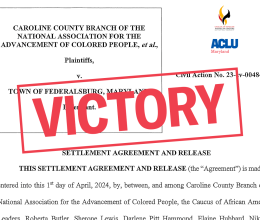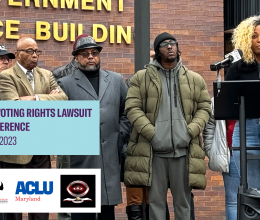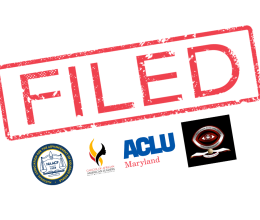
MEDIA RELEASE
ACLU Raises Concerns About the Legality, Vulnerability to Fraud of
Maryland Online Petition System
FOR IMMEDIATE RELEASE
June 10, 2011
CONTACT: Meredith Curtis, ACLU of Maryland, 410-889-8555; media@aclu-md.org
BALTIMORE – Concerned that the online petition system being used to gather signatures to petition the Maryland DREAM Act to referendum is illegal and vulnerable to fraud, the American Civil Liberties Union of Maryland (ACLU) has written to the State Board of Elections (SBE) to ask that the system’s legality be scrutinized. The May 31 letter was sent to raise threshold legal questions at the outset of validation and verification – after an ACLU tester found that the systems pre-fills information for voters based on very basic personal data, and that one person could easily generate petitions for multiple voters and submit them to the SBE for validation.
“Online systems for signature gathering in support of a petition drive are new to Maryland, and raise serious questions about whether election officials can meaningfully scrutinize the authenticity of signatures, verify each signer’s intent, and investigate possible acts of fraud,” said Deborah Jeon, Legal Director for the ACLU of Maryland. “Unfortunately, the ACLU in the past discovered widespread fraud in a different referendum petition drive, so we know from experience how important it is for the state’s laws to be strictly followed.”
The online petition system at mdpetitions.com could be highly susceptible to fraud. Any user who knows the name, zip code, and birth date of an individual can easily generate a petition for that person, forge the individual’s signature, and fraudulently verify the petition on the individual’s behalf. Because the system automatically pre-prints complete information for every registered voter at a particular location, any computer user could also enter his or her own information and sign for other residents at the user’s address without these individuals’ knowledge or consent.
Maryland law prohibits the use of “pre-filled” petition forms such as those generated by the website, instead requiring that each signer of a petition personally provide the relevant information about himself or herself. (Election Law § 6-203, COMAR 33.06.03.06). Since the online system at mdpetitions.com allows any computer user to acquire complete and official information about any individual for whom he or she has just a name, zip code and birth date, it will be extremely difficult for state election officials to ensure that signatures submitted using the online form are legitimate – particularly if there exist tens of thousands of self-verified online petitions.
The Maryland Constitution and state laws establish strict standards for petitions, because the referendum process allows a small percentage – just three percent – of voters to place on hold a law enacted by representatives of the majority. Given this drastic effect, Maryland courts have been vigilant in enforcing the rules, so as to prevent fraud and to ensure that each signature collected reflects a true vote to overturn a law enacted by our popularly-elected legislature. As the gatekeeper of the ballot, it is critically important for the State Board of Elections to be able to carefully scrutinize the petitions submitted so that fraudulent signatures are not validated.
“As a principle, the ACLU believes it is wrong to put people's rights up for a popular vote, and it is even more troubling to do so when the system being used to collect petition signatures is one so easily sabotaged by fraud,” said David Rocah, staff attorney for the ACLU of Maryland."
###






